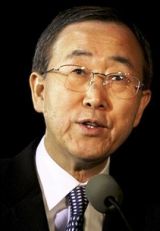UN chief calls coming months “crucial” for Darfur peace
August 3, 2007 (UNITED NATIONS) — Secretary-General Ban Ki-moon on Friday called the coming weeks and months crucial in the quest for peace in Darfur with new momentum on the political front and approval of a joint African Union-U.N. peacekeeping force to help stem the violence.

The report was released ahead of a three-day meeting this weekend in Arusha, Tanzania, organized by the U.N. and AU to get Darfur’s various splinter rebel factions to agree on an agenda for future peace talks and help improve their negotiating skills.
It also follows Tuesday’s unanimous approval by the U.N. Security Council of a 26,000-strong AU-U.N. peacekeeping force for Darfur to help end four years of rape and slaughter of civilians in the vast Sudanese region.
“The coming weeks and months will be a crucial period in the quest for peace in Darfur,” Ban said.
The joint effort by the U.N. and the African Union to achieve a political solution “will gain momentum” as special envoys from the two organizaations “make every effort to commence negotiations” between all combatants and the government, he said.
At the same time, the secretary-general said, implementing the Security Council resolution on the AU-U.N. “hybrid” force will be “a major litmus test of the political will of all involved.”
Ban said the successful deployment of the hybrid force “will very much depend on the government’s cooperation and assistance, especially with regard to the provision of adequate land, permission to drill for water and the timely clearance of critical mission-support items through customs.”
The international community in the next month must also offer the troops and police for the hybrid operation so that the AU-U.N. force can take over as quickly as possible from the underfunded and poorly equipped 7,000-strong AU force currently on the ground in Darfur, which has been unable to stem the violence, he said.
Meanwhile, Ban said he was very concerned at the “very precarious” situation in Darfur where violence and insecurity continues, including bombings by the Sudanese military of civilian areas, ground attacks against civilian villages, a resurgence of inter-tribal clashes, and the systematic rape of women and girls.
Since the beginning of the year, he said, more than 150,000 people have fled their villages, most seeking refuge in camps for internally displaced people that in many cases are already overcrowded.
Ban said the continuing insecurity has forced humanitarian organizations to curtail some programs, leading to “the deterioration of the living conditions of the millions of conflict-affected people who depend on humanitarian agencies for their survival.”
“It is estimated that 566,000 of the 4.2 million conflict-affected persons in Darfur are currently cut off from humanitarian assistance,” he said.
Ban also expressed concern at the upsurge in attacks targeting African Union and U.N. peacekeepers as well as the humanitarian community.
Looking ahead at the upcoming “critical phase,” the secretary-general said international efforts must continue “in earnest” on the political, peacekeeping, humanitarian and development tracks.
“There must be substantial progress towards a political settlement and concrete action to strengthen peacekeeping through the hybrid operation,” Ban said.
“We must also ensure that the massive humanitarian assistance program continues to sustain millions of people in Darfur he said. “Finally, recovery, development and rehabilitation strategies must be put in place to ensure that these critical longer-term considerations are addressed.”
More than 200,000 people have been killed and 2.5 million uprooted since the conflict in Darfur began in February 2003 when ethnic African tribes rebelled against what they consider decades of neglect and discrimination by the Arab-dominated government.
Sudan’s government is accused of retaliating by unleashing a militia of Arab nomads known as the janjaweed, a charge it denies. The Darfur Peace Agreement, signed a year ago by the government and one rebel group, has been unable to stop the violence because other rebel factions rejected it and have continued fighting.
(AP)
